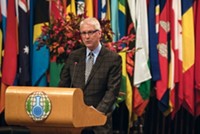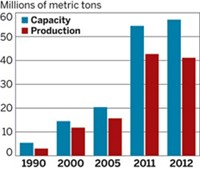Advertisement
Grab your lab coat. Let's get started
Welcome!
Welcome!
Create an account below to get 6 C&EN articles per month, receive newsletters and more - all free.
It seems this is your first time logging in online. Please enter the following information to continue.
As an ACS member you automatically get access to this site. All we need is few more details to create your reading experience.
Not you? Sign in with a different account.
Not you? Sign in with a different account.
ERROR 1
ERROR 1
ERROR 2
ERROR 2
ERROR 2
ERROR 2
ERROR 2
Password and Confirm password must match.
If you have an ACS member number, please enter it here so we can link this account to your membership. (optional)
ERROR 2
ACS values your privacy. By submitting your information, you are gaining access to C&EN and subscribing to our weekly newsletter. We use the information you provide to make your reading experience better, and we will never sell your data to third party members.
Policy
Russia withdraws from plutonium, nuclear research pacts
Deteriorating talks with U.S. over Syria prompted Moscow’s move
by Paula Dupraz-Dobias, special to C&EN
October 12, 2016
| A version of this story appeared in
Volume 94, Issue 41
Russian President Vladimir Putin announced earlier this month that he is scrapping a treaty with the United States for the disposal of weapons-grade plutonium. Two days later, Moscow suspended a nuclear research agreement with Washington.
The decisions come amidst a deterioration of bilateral talks over the conflict in Syria. The U.S. State Department announced the suspension of those discussions aimed at assuring a ceasefire in Syria just hours after Putin’s announcement.
The 2010 agreement on plutonium, signed by Russian foreign minister Sergei Lavrov and then-U.S. Secretary of State Hillary Clinton, was part of a “reset” of improved relations between the two countries. It required each party to dispose of 34 metric tons of the radioactive element by burning it in nuclear reactors. At the time of the treaty’s conclusion, Clinton said there was enough material to produce almost 17,000 nuclear arms.
The nuclear research and development agreement, signed in September 2013, called for wide-ranging cooperation on nuclear fusion research, irradiation of fuels and materials in a research reactor, nuclear nonproliferation, and environmental remediation of radioactive sites.
Within months of the agreement, scientists from both countries began identifying cooperation projects and working on technical considerations.
By 2014, Russia had already warned that it would reduce cooperation in a joint effort to keep nuclear materials out of the hands of terrorists or rogue states. The Kremlin’s recent abrogation of the plutonium agreement makes it unlikely that cooperation will resume any time soon.
In exchange for restarting talks, Putin demanded that the United States lift economic sanctions imposed over Ukraine, repeal a provision that froze the assets of Russian officials suspected of human rights violations, and reduce the number of American troops in North Atlantic Treaty Organization (NATO) member states.
Meanwhile, the Russian government left the door slightly open for future resumption of nuclear cooperation saying they could recommence “when that is justified by the general context of relations with the United States.”
White House press secretary Josh Earnest said the administration is disappointed with Russia’s decision to withdraw from the plutonium pact because “both leaders in Russia and the United States have made nonproliferation a priority.”




Join the conversation
Contact the reporter
Submit a Letter to the Editor for publication
Engage with us on Twitter